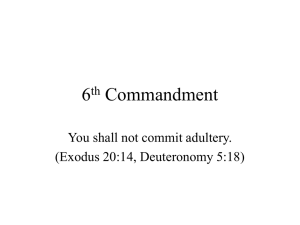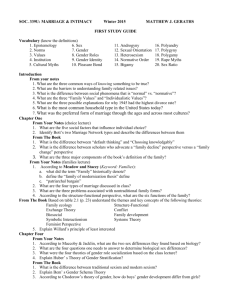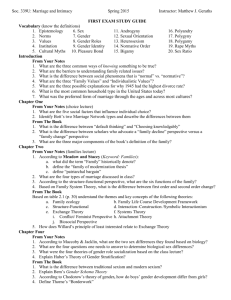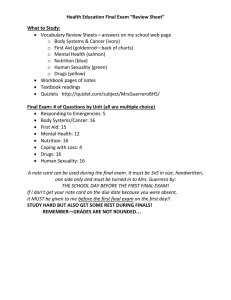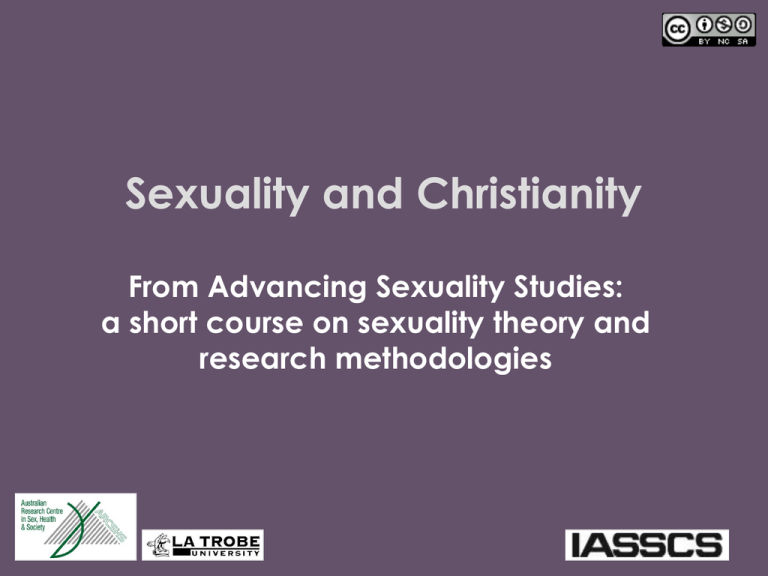
Sexuality and Christianity
From Advancing Sexuality Studies:
a short course on sexuality theory and
research methodologies
Schedule
Learning activity
Introduction & aims
Time allowed
5 mins
Session 1. Christian approaches to sexuality: four key
themes
Brainstorm
Lecture & brainstorm
Lecture & group work
Lecture
170 mins
Session 2. The key themes in action
Group work
Discussion
120 mins
60 mins
60 mins
65 mins
15 mins
70 mins
20 mins
Session 3. Scope to engage?
Mini-lecture
Hypothetical strategising
65 mins
15 mins
50 mins
Conclusion & personal reflection
15 mins
Total
375 mins
2
Module aims
• To:
– Provide an account of Christian approaches to sexuality, through
examination of four key themes
– Examine a range of Christian responses to contemporary
sexuality issues
– Encourage students to challenge taken-for-granted
interpretations of sexuality within Christianity
3
Participants will:
– Be able to identify four key historical and philosophical themes
that underpin Christian understandings of sexuality
– Develop a critical understanding of the application of Christian
beliefs and practices on sexuality in the contemporary world
– Consider strategies for engaging positively with Christian
communities on issues of sexuality
4
Session 1.
Christian approaches to
sexuality: four key themes
5
Brainstorm
What might Pope
Benedict XVI say
about…
Men, women
and human
nature?
What might the Most
Reverend Peter
Akinola, Archbishop
of Nigeria, say about…
Homosexuality?
What might Pastor Martin
Ssempa of the Makerere
(Protestant evangelical)
Community Church,
Uganda, say about…
Protection against
HIV?
What might the
Most Reverend
Rowan Williams,
Archbishop
of Canterbury, say
about…
Marriage?
6
What they actually said …
Pope Benedict XVI on men,
women and human nature:
The Church must protect
people against self-destruction
…and so we need something like human
ecology, properly so called … the Church
speaks of human nature as ‘man’ or ‘woman’
and asks that this order of things [the Natural
Law] be respected.
(2008)
Peter Akinola on homosexuality
Same sex marriage, apart from
being ungodly, is unscriptural, unnatural,
unprofitable, unhealthy … un-African and
un-Nigerian. It is a perversion, a deviation and an
aberration that is capable of engendering moral and
social holocaust in this country … [and] should never
be allowed to take root in Nigeria. Outlawing it is to
ensure the continued existence of this nation. (2009)
Martin Ssempa on protection against HIV
Some of you know about the HIV/AIDS conference.
It’s not a Church. It’s like Sodom and Gomorrah
just to be there ... should the godless be the
only ones telling us what to do about HIV? … we know
that if we kept sex for within marriage and if we waited for
sex within marriage AIDS would go away ... the way to
protect ourselves from HIV/AIDS is in [the Bible] …
abstinence … laws must bow down to Jesus.
(2007)
Rowan Williams, Archbishop of
Canterbury, on marriage
The gospel is about a man who made
his entire life a sign that speaks of God
and who left to his followers the promise that
they too could be signs of God and make signs
of God because of him …sexual love becomes
sacramental when it involves a lasting
…fidelity.
(1994)
7
Four key themes
• Observance of the Natural Law
– Human knowledge of right and wrong + ‘The eternal will of God’
• Fidelity to what the scriptures say
– ‘The word of God’
• Both reinforced through the sacraments
– Given for particular forms of behaviour; ‘God’s blessing’
• All linked to promotion of the practices of continence,
celibacy & abstinence, chastity & virginity
8
Natural Law: theory & practice
• The Natural Law is that body of principles that aligns:
– How human beings know what is good, and do what is right
with
– The ‘eternal law’, or the rational plan by which God orders the
whole universe
• In practice:
– We use our conscience to reason from principles about what is
good to guidelines about how good is to be pursued
– The end never justifies the means
• You cannot do something intrinsically wrong to achieve something good
9
• According to Catholic Church teaching on Natural Law:
– You cannot abort a child to save a mother’s life, because it is
killing the child
– You cannot use condoms to prevent disease, because it is
preventing procreation
– You cannot have gay sex to build or support a loving relationship
– You cannot have sex before marriage, because the family is the
base of social life and sex is for procreation
10
The scriptures
• Every Christian church draws on the scriptures
– Set of writings that comprise the Bible; Old & New Testament
– Some churches rely more heavily than others on the scriptures to
support their views on sexuality
• Usually called: fundamentalist, evangelical or bible-based churches
– Other churches give more explicit weight to tradition, practice or
the teaching authority of their leaders
– Evangelical churches still rely on their leaders to select among
and interpret various Bible texts to sustain beliefs and positions
• No single agreed interpretation
11
Brainstorm
• What aspects of sexuality are usually of concern to the
Christian church?
(5 mins)
• How the scriptures are interpreted in relation to just two
aspects of sexuality:
– Marriage and divorce
– Homosexuality
12
Scriptures: marriage & divorce
• Gospel of Matthew 19:4ff
– Pharisees came up to [Jesus] and tested him by asking: ‘Is it
lawful to divorce one's wife for any cause?’
– He answered: ‘Have you not read that he who made them from
the beginning made them male and female, and said: “For this
reason a man shall leave his father and mother and be joined to
his wife, and the two shall become one flesh”? So they are no
longer two but one flesh. What therefore God has joined together,
let not man put asunder.’
13
– They said to him, ‘Why then did Moses command one to give a
certificate of divorce, and to put her away?’
– He said to them, ‘For your hardness of heart Moses allowed you
to divorce your wives, but from the beginning it was not so. And I
say to you: whoever divorces his wife, except for unchastity, and
marries another, commits adultery’
• St Paul’s first letter to the Corinthians 7:10ff
– To the married I give charge, not I but the Lord, that the wife
should not separate from her husband (but if she does, let her
remain single or else be reconciled to her husband)—and that
the husband should not divorce his wife
14
Scriptures: homosexuality
• Genesis 19:4ff
– But before they lay down, the men of the city, the men of Sodom,
both young and old, all the people to the last man, surrounded
the house; and they called to Lot, ‘Where are the men who came
to you tonight? Bring them out to us, that we may know them.’
– Lot went out of the door to the men, shut the door after him, and
said, ‘I beg you, my brothers, do not act so wickedly. Behold, I
have two daughters who have not known man; let me bring them
out to you, and do to them as you please; only do nothing to
these men, for they have come under the shelter of my roof.’
15
– The meaning of the word ‘know’ is of particular debate
• Interpreted either as the citizens wanting to sexually assault the strangers
or, as the citizens wanting to interrogate the strangers
• The original Hebrew word for ‘know’ appears approximately 950 times
elsewhere in the scriptures, yet in only 10 of those times is it used to refer
to sexual contact (Friends of Unity, 2006; Rogers, 2006)
– One of those 10 times occurs in this passage, where Lot is talking about his
daughters not having ‘known’ man
• In the gospel of Matthew, Jesus refers to Sodom and Gomorrah when
talking about the importance of hospitality
16
• Natural Law and scripture are used together by the Catholic
Church to justify its position on homosexuality:
– Basing itself on sacred Scripture,"which presents homosexual
acts as acts of grave depravity, tradition has always declared that
homosexual acts are intrinsically disordered. They are contrary to
the Natural Law. They close the sexual act to the gift of life. They
do not proceed from a genuine affective and sexual
complementarity. Under no circumstances can they be approved.
(Catechism of the Catholic Church 2357)
17
Group work
• Question A:
– What forms of marriage and divorce occur in your community?
• Who can marry? Who can divorce?
– Is this controlled, e.g. by religion or by the State?
• Are there differences between the rights or treatment of men and women?
• Question B:
– Is homosexuality accepted within your community?
• What does the State say? What do religions say—particularly Christianity?
• Are there differences between the rights or treatment of homosexual
people and heterosexual people?
(20 mins)
• Feedback
(20 mins)
18
The sacraments
• Sacraments represent God’s blessing or grace upon the
individual
– The Church of England Book of Common Prayer (1549) calls
them ‘outward and visible signs of an inward and invisible Grace’
• Celebrated in ritual ceremonies such as Baptism, Holy
Communion, marriage
… it is not good that the man should be alone; I will make
him a helper fit for him (Genesis 2:18)
19
Sacraments & marriage
… a sacramental marriage lets the world see, in human
terms, something of the faithful, creative, abundant, and
self-emptying love of Christ. A true marriage in the Lord
with his grace will bring the spouses to holiness.
Their love, manifested in fidelity, passion, fertility,
generosity, sacrifice, forgiveness, and healing, makes
known God’s love in their family, communities, and society.
(US Catholic Bishops (2003) Between Man and Woman)
20
The fourth theme
• Continence, celibacy & abstinence, chastity & virginity
• Continence is restraint from sexual activity
• Celibacy is abstinence from sexual activity & from marriage
– Celibacy versus marriage:
• He that is without a wife is solicitous for the things that belong to the Lord,
how he may please God. But he that is with a wife, is solicitous for the
things of the world, how he may please his wife: and he is divided
(St Paul’s first letter to the Corinthians 7:33)
• Chastity is a state of purity; denoted by virginity until
marriage and faithfulness after marriage
21
Session 2.
The key themes in action
22
Group work
• Handout A: Christianity and HIV/AIDS
– Focus questions:
• Some parts of the Catholic Church are opposed to education about, and
promotion of, condoms for HIV prevention. How are the four main themes
of a Christian approach to sexuality used to support this opposition?
• Some parts of the Catholic Church (and other churches) disagree with the
teaching that condoms cannot be used for prevention of HIV. What
rationales do they use?
• How do Christian churches that do not allow condom use for HIV
prevention reconcile this with the associated risk of harm to church
members?
• How do (or might) churches opposed to condom promotion explain their
position to those who have become infected with HIV?
23
• Handout B: Christianity and reproductive health
– Focus questions:
• Some churches are opposed to contraception and abortion. How are the
four main themes of a Christian approach to sexuality used to support this
opposition?
• Some churches accept contraception or abortion. What rationales do they
use?
• How do Christian churches that do not allow access to non-natural
contraception or abortion reconcile this with the associated risk of harm to
church members?
• What do these texts indicate in relation to relationships between Christian
churches, the state and society on issues of sexuality and reproductive
health?
24
Discussion
• Christianity and homosexuality
– Individual reading of Handout C
– Consider the focus questions:
(15 mins)
• Some Christians argue that homosexuality should not be accepted.
What arguments do they offer? Do they use the four key themes?
• Some Christians argue that homosexuality should be accepted.
What arguments do they offer? Do they use the four key themes?
• How are historical, cultural social norms used (or not used) by each side?
• Based on these texts, what links exist between the Christian church,
the State and broader social debate?
– Discussion
(40 mins)
25
Session 3.
Scope to engage?
26
No one Church position
•
William Stacey Johnson (2007:40) defined seven
positions on same sex unions at work in Christian
churches in the U.S.:
1. Prohibition: does not approve of, and would bar, same sex
unions (because they are morally wrong)
2. Toleration: does not approve of gays and lesbians amongst its
own members, but would not encourage general social
prosecution or rejection
3. Accommodation: does not ordinarily approve, but would allow
for exceptions on a ‘lesser-of-the-evils’ rationale
27
4. Legitimation: wants to include gays and lesbians in the
community and wants to prevent them being singled out and
condemned unfairly
5. Celebration: believes same-sex unions should no longer be
scorned but affirmed as good
6. Liberation: perceives social attitudes concerning gays and
lesbians as being caught up in wider injustices which need to be
remedied
7. Consecration: argues for the full religious blessing of same-sex
unions
28
• Engaging with proponents of
– Natural Law: they must believe there is some ‘good’ in addition to
procreation in sexual relationships before their conscience will allow latitude
– Scripture: much will depend on the texts selected, and the leadership’s
degree of literalism in interpretation of them
– Sacrament: the value attached in sacraments to fidelity, passion, fertility,
generosity, sacrifice, forgiveness, and healing creates space for discussion
– Virginity/abstinence: perhaps the least open to alternative views
because of an implicit distrust of human sexuality
29
Hypothetical strategising
• Divide into small groups
• Everyone works for the same non-governmental
organisation (NGO), in a developing country
– The organisation provides:
• STI diagnosis and treatment (for everyone, including men who have sex
with men)
• Family planning advice and contraception (including condoms and the
morning after pill)
• Voluntary, confidential counselling and testing (VCCT) for HIV
• HIV-prevention education
• Care and support for people living with HIV and people living with AIDS
30
• The local Christian Bishop is known to have objections to:
–
–
–
–
Men who have sex with men (MSM)
Sex before marriage
Contraception
Any approach to HIV prevention other than promotion of
abstinence and faithfulness within marriage
• The number of people using your organisation’s services
has begun to decline
– There is concern that this is as a result of the Bishop’s objections
31
• Focus questions
– How would you respond to this situation?
– What would you need to consider in terms of enabling your
organisation’s work to continue effectively?
– Is keeping service-user numbers high your organisation’s only
concern and responsibility here?
• Group members should draw on any relevant real-life
experience they may have
(30 mins)
• Feedback
(20 mins)
32
Conclusion
• What will you take away from this module?
(5 mins)
• In summary:
– No one Christian view of sexuality
– Four commonly recurring themes: Natural Law, Scriptures,
sacrament, emphasis on continence, celibacy and abstinence,
and chastity and virginity
– Complex (and power-laden) interrelationships between
Christianity and political, social and cultural responses to, and
understandings of, sexuality
– Some space for movement
33
• Module created by:
– Terry Laidler and Bill O’Loughlin
• Short course developed by:
– The Australian Research Centre in Sex, Health and
Society, La Trobe University, Melbourne, Australia
and
– The International Association for the Study of Sexuality,
Culture and Society (IASSCS)
– With funding from The Ford Foundation
Available under an Attribution, Non-Commercial, Share Alike licence from
Creative Commons
34


